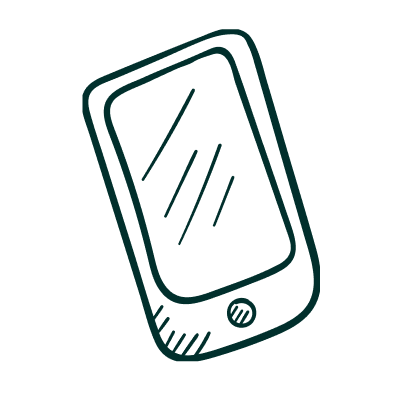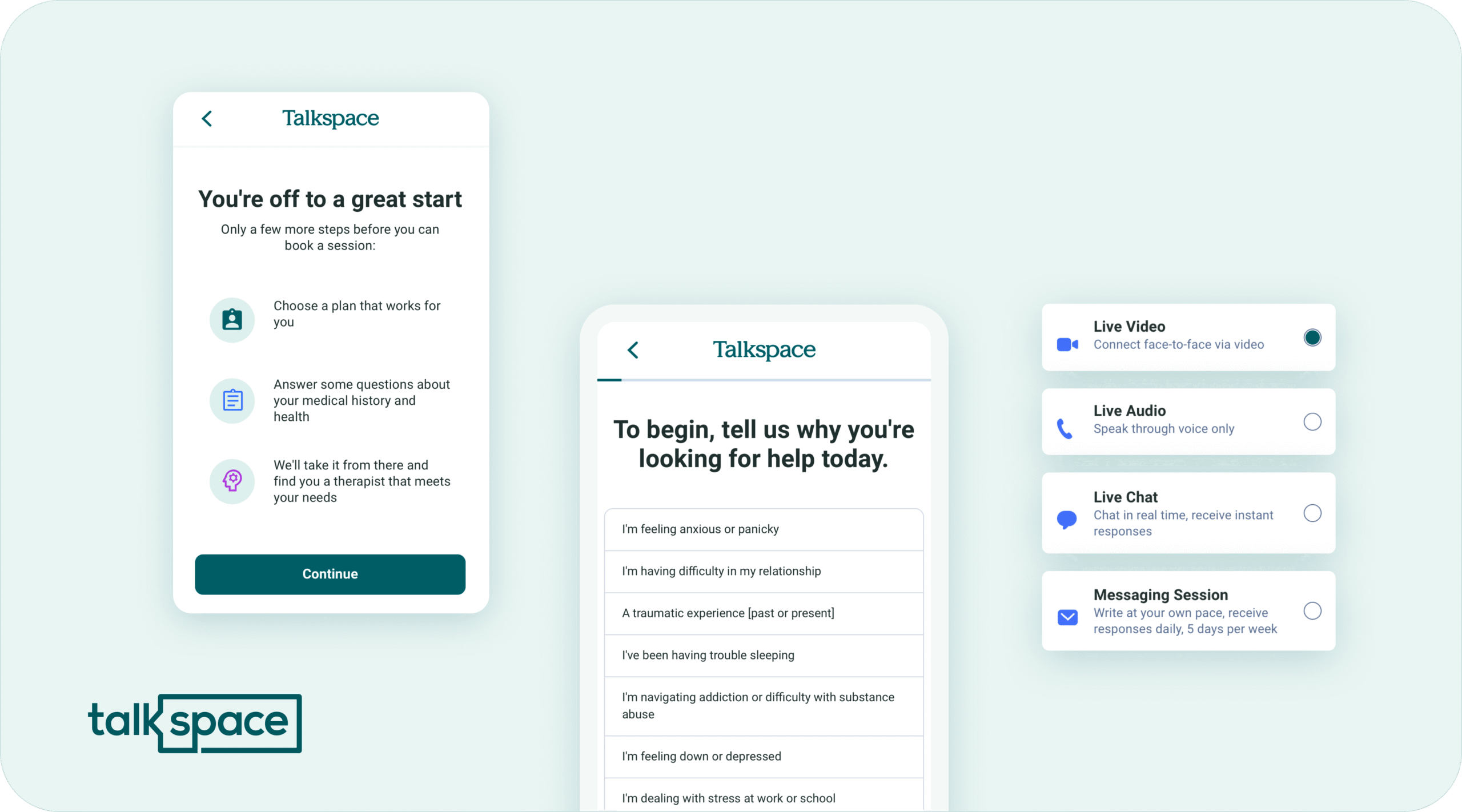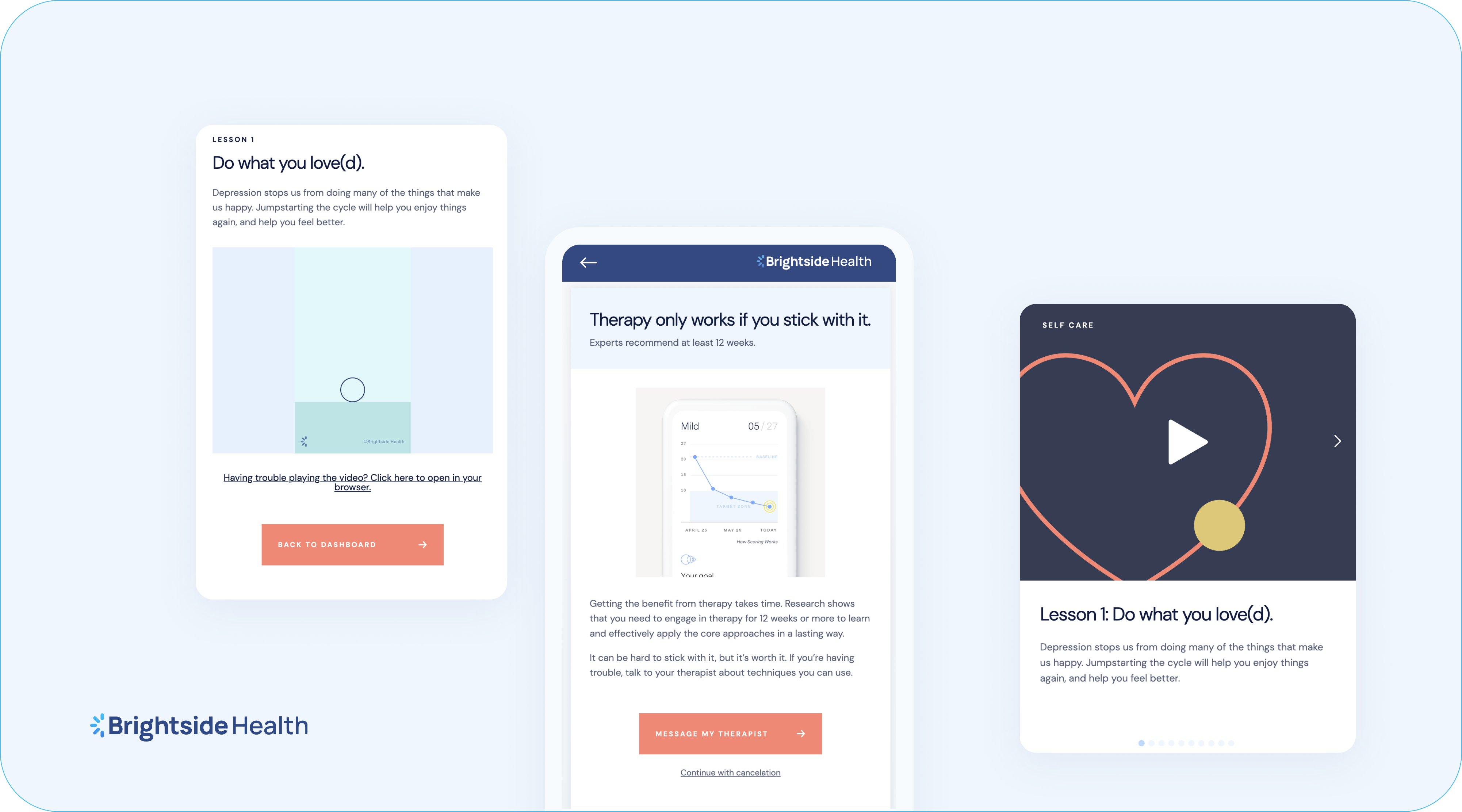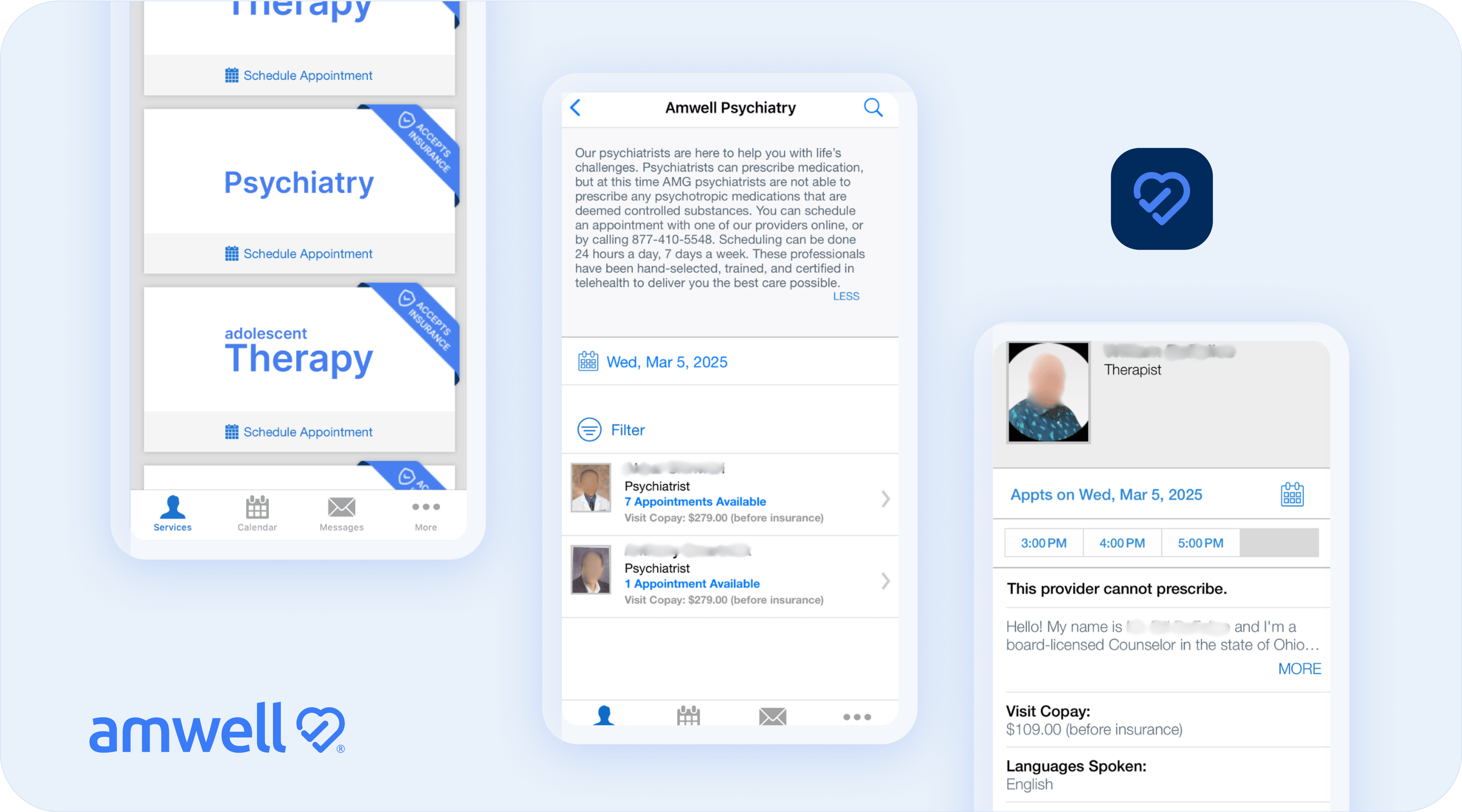

This therapist directory is offered in partnership with BetterHelp. If you sign up for therapy after clicking through from this site, HelpGuide will earn a commission. This helps us continue our nonprofit mission and continue to be there as a free mental health resource for everyone.
Need to talk to someone now? Find a crisis helpline
If you're a BetterHelp therapist with questions about your directory listing, please contact therapists@betterhelp.com
Looking for an online psychiatrist? HelpGuide’s editorial staff surveyed real users and personally tested and reviewed the best virtual psychiatry platforms, rating them based on a wide range of factors, including quality of care, affordability, privacy, and user experience.

We independently test and review all of the services we recommend. When you sign up through our links, we may earn a commission, which helps support our nonprofit mission.
Online psychiatry can be a convenient way to find mental health care and manage your medications from the comfort of home. With so many platforms offering psychiatric care and medication management, though, it can be difficult to know which service is the right one for you. To help you find a psychiatric provider that offers professional and responsible care, HelpGuide’s editorial staff gathered data on 46 online psychiatry platforms, surveyed over 1,000 users, and personally tested the 12 highest-rated services.
We found that:
Short appointment wait times.
Since its founding in 1999, HelpGuide.org has been an independent nonprofit providing trustworthy mental health information to millions of people each year. Our content has always been focused on delivering accurate, unbiased, and well-researched health information that our readers can rely on for actionable steps to improve how they feel. We decided to bring those same principles to reviewing online psychiatry services.
HelpGuide’s editors, writers, and support staff spent hundreds of hours over three months conducting user surveys, gathering data on 46 online psychiatry services, and personally testing 12 platforms. We spent many more hours consulting with mental health experts, including members of our Professional Advisory Council, about how to most accurately assess and review online psychiatry sites.
We began by researching 46 online psychiatry platforms, evaluating each on a wide range of critical factors, including provider choice, cost transparency, insurance acceptance, data privacy policies, and the availability of benefits like financial aid and unlimited messaging in between sessions.
Our team analyzed pricing models, cancellation policies, platform certifications, and HIPAA compliance to help identify which services offer the best value and safest user experience. We also assessed how easy it was to access psychiatric services for people with different needs including those with disabilities, users in rural areas, and people specifically seeking care from someone of the same cultural background.
To refine our methodology, we consulted with psychiatrists and other mental health professionals, including members of our Professional Advisory Council. They reviewed our evaluation criteria and helped us refine how we scored platforms for quality, safety, and ethical standards. Their input ensured our rankings reflect what truly matters in a telehealth setting, such as clinical effectiveness, professional integrity, and provider trust and rapport.
HelpGuide is run by a group of staff who are located in just three different states. So rather than relying solely on our own experiences, we spent months seeking out the opinions of online psychiatry users from all across the country. We ended up with an in-depth survey of over 1,000 real online psychiatry users that measured factors such as value for money, ease of use, provider quality, and overall satisfaction.
We asked users everything from how online psychiatry compared to in-person care to the length of the signup process to any technical issues that disrupted their experience. We discovered if they felt comfortable recommending a platform to loved ones and how much their treatment helped to improve how they felt. This detailed feedback about what matters most to actual online psychiatry users helped shape our scoring methodology and determine our final recommendations.
After narrowing down all the platforms we researched to 12 options that met our scoring qualifications, we conducted real world testing. To really understand the user experience, HelpGuide staff members tested the online psychiatry services. Our staff used the platforms as regular users would, without disclosing who we worked for or what our aims were. We solely wanted to experience each platform as regular users would.
On each platform, our staff members went through the intake and matching process and booked and attended an online psychiatry session. We assessed how well the platform functioned, the crisis resources in place, and the provider quality—how well they explained treatment benefits and drawbacks, potential medication side effects, and how often we should be reassessed. On each platform, we messaged our psychiatric care providers between sessions, contacted customer support, and examined the service’s privacy and security policies. If a platform offered extra features, such as worksheets, journals, or meditations, we tested them all.
Finding the right online psychiatrist can often involve talking to different providers to find someone you’re comfortable with, so we also went through the process of switching providers. Finally, we closed our accounts, noting any billing and refund issues.
As we were testing online psychiatry platforms, each member of staff kept a weekly journal recording their experiences. At the end of testing, they each completed detailed questionnaires about the service they used, which helped us compare the different platforms based on the same objective criteria. Finally, we matched notes and shared experiences to bring you our selections for the best online psychiatrist platforms.


Therapist quality and matching accuracy

Pricing and value for money

Session types and communication options

Ease of use and platform navigation

Insurance coverage and payment options

Privacy and security

Customer service experience

| Who Talkspace is most suitable for: | Those wanting to check their insurance coverage before having to create an account |
| Starting price: | $299 initial appointment and $175 per follow-up |
| Insurance accepted? | Yes – all major plans |
| Financial aid: | Discounted pricing for bundling psychiatry and therapy |
| Session formats: | Video and messaging |
| Time to first session with provider: | 1-7 days (93 percent of users) |
| Services: | Psychiatry, medication management |
| Therapy services: | Yes |
We surveyed 100 users of Talkspace’s psychiatry services across the United States and had one of our in-house staff test the platform. In both our survey results and our testing experience, Talkspace scored highly in user satisfaction. 91 percent of those who used Talkspace’s online psychiatry services would recommend the service to a friend or colleague. While our testing experience revealed issues with getting insurance approved for psychiatry, 87 percent of the users we surveyed had an easy or very easy signup process.
“My therapist and psychiatrist worked together seamlessly, which was really helpful.”
Survey respondent
“My provider was kind, responsive, and really helped me understand my treatment.”
Survey respondent
Overall satisfaction:
Value for cost:
Empathy rating:
Privacy and security rating:
Platform navigation rating:
“Talkspace was unable to confirm my coverage for psychiatry so I had to pay out of pocket.”
Lawrence Robinson, Managing Editor
“I appreciated how cautious my provider was about prescribing medication unnecessarily . . . and why she didn’t want to leave a long gap between appointments.”
Lawrence Robinson, Managing Editor
Talkspace’s sign-up takes less than 20 minutes for most people (74 percent), and 89 percent thought the process for getting started with medication and meeting a provider was clear or very clear. Here’s what happens:
Check insurance acceptance and copay.
Create an account.
Answer questionnaires about health history, current symptoms, and provider preferences.
Get matched with a provider.
Tested by: Lawrence Robinson, Managing Editor
Talkspace covers the entire United States as well as other countries such as Canada and the UK (its prices can be listed in either USD $ or GBP £). Since prescribing medications is regulated differently by other countries’ health care systems, though, you’ll likely need to see a prescriber who’s licensed in your country to access prescription medications outside the US.
While our member of staff testing Talkspace found signing up for therapy on the platform to be a breeze, he found the process for creating a psychiatry account far less straightforward. His information submitted when creating a therapy account didn’t carry over to psychiatry, so he had to answer a lot of the same questions a second time. The insurance check that took moments for online therapy was unable to approve him for psychiatry. He was asked to submit photos of his insurance card and driver’s license to verify his identity and was told he’d hear back in three to five days. If you’re feeling overwhelmed by a mental health issue and anxious to start treatment, that can seem like a long time to have to wait. Our tester’s experience was different to the vast majority of Talkspace users we surveyed, 87 percent of whom found the signup process easy or very easy. Our staff member did appreciate that crisis lines were displayed prominently for those in need of immediate help.
As it was, our tester heard back within 24 hours that Talkspace was still unable to verify his insurance coverage. Rather than delay the process any longer, he decided to pay out of pocket, instead—$299 for the first appointment. Our tester was matched with a provider within two hours, a psychiatric mental health nurse practitioner (PMHNP). He booked the earliest available appointment, which was eight days away. Again, this doesn’t seem typical. 93 percent of the users we surveyed had their first appointment within six days.
The first psychiatry appointment on Talkspace was scheduled for 60 minutes, but our member of staff testing the service required only about half that time to cover everything. He felt the provider was empathetic, easy to talk to, and “reassuringly thorough” in her assessment. They discussed his medical history and symptoms in great detail, including a detailed crisis screening. The PMHNP felt his symptoms could be caused by an underlying physical issue and had concerns about prescribing any medication at this point. Again, our member of staff found the provider’s approach responsible and reassuring. Instead, she generated an order for blood work for him to take to his primary care doctor or a local lab.
At the end of the appointment, the psychiatric provider initially wanted to schedule a follow-up appointment in three weeks, giving him time to get the blood work completed. However, once she realized he was paying out of pocket, she pushed that to four weeks. She was mindful of the personal cost involved and wanted to balance that with ensuring he received timely care. Our member of staff felt that was another thoughtful touch from an excellent provider. The PMHNP also reiterated that Talkspace does take his insurance so he should message customer support or his insurance company to find out why it wasn’t accepted.
Despite the difficulties with insurance coverage, our member of staff couldn’t fault the in-depth screening process, the exceptional provider, and overall quality of care on Talkspace. Our survey respondents were equally impressed by their overall experience on Talkspace, with 91 percent saying they’d recommend the platform to friends or colleagues.
Our total score
Based on expert testing and real user feedback
We like that Talkspace accepts major insurance plans and allows you to check if you’re covered (and how much your copay will be) before having to create an account. The platform has been criticized for privacy issues in the past, but our staff member felt secure that the platform had protected his information—although it took some form-filling to achieve. We were also impressed with the quality of psychiatric care on Talkspace.
Bottom line:
Thorough screening, quality providers, and you can check your insurance coverage before having to create an account.

| Who Talkiatry is most suitable for: | Those with insurance looking for psychiatry and medication management but not therapy. |
| Starting price: | Copays vary; most are about $15-30 per visit. |
| Insurance accepted? | Yes – all major plans |
| Financial aid: | No |
| Session formats: | Video and messaging |
| Time to first session with provider: | 1-3 weeks |
| Services: | Psychiatry, medication management |
| Therapy services: | No (only with referral) |
We surveyed 100 Talkiatry users across the United States and had one of our in-house team test the platform. In both our survey results and our testing experience, we found that the greatest strength of Talkiatry was the quality of psychiatric care provided and value for money. However, the service isn’t available in every state, it only accepts insurance, and the wait to see a provider can be a little longer than some other platforms—19 percent of our survey respondents waited a week or more for an appointment.
“Talkiatry made accessing psychiatric care easier than I imagined.”
Survey respondent
“Talkiatry exceeded my expectations in terms of accessibility and care.”
Survey respondent
Overall satisfaction:
Value for cost:
Psychiatrist responsiveness rating:
Privacy and security rating:
Progress towards goals rating:
“I felt like I was listened to and not just shuffled through a system to get as many patients as possible.”
Lawrence Robinson, Managing Editor
“Of the platforms I’ve tested, the psychiatrist I found on Talkiatry was the most thorough and insightful. We covered a lot of ground in the 45-minute session.”
Lawrence Robinson, Managing Editor
Talkiatry’s sign-up takes 10-20 minutes for most people (73 percent), but nearly one in five (19 percent) waited at least a week for their first appointment. Here’s what happens:
Verify email.
Enter personal details.
Take the free online assessment.
Choose a provider.
Verify insurance.
Tested by: Lawrence Robinson, Managing Editor
Talkiatry is a virtual psychiatry platform that specializes in the treatment of anxiety, depression, ADHD, OCD, child and adolescent care, bipolar disorder, PTSD, and pregnancy and postpartum issues. It has a network of over 600 psychiatrists covering 43 states, but is not currently available in Alaska, Delaware, Hawaii, Idaho, New Mexico, North Dakota, Wyoming, or anywhere outside of the U.S. Talkiatry accepts users with health insurance only, including Medicare. While the platform does have some therapists, these are only accessible if your psychiatrist includes therapy as part of your treatment.
From the signup process to verifying insurance to the quality of her psychiatrist, the member of HelpGuide’s team testing Talkiatry gave the platform high marks across the board. However, he felt that insurance verification could be a little more difficult if you aren’t the primary on the insurance plan.
Talkiatry gave our team member a list of matching providers from which he chose a psychiatrist who proved to be an excellent match. While the psychiatrist was late starting the session, she messaged him in advance to let him know she was running late and, once it started, their session still lasted for over 45 minutes. Our staff member was extremely impressed by the thoroughness of the session. When he outlined his symptoms, the psychiatrist made him feel heard and validated and went into his background in-depth. She took the time to explain the different medication options, was open and honest about potential side effects and drawbacks, and responsive to all of our staff member’s questions. He felt reassured that the psychiatrist was happy to let him decide what the best option would be. Our staff member did note that it’s important to log on for the initial appointment a few minutes early in order to complete the pre-session questionnaire, something that Talkiatry didn’t warn him about.
Our tester’s positive experience with his psychiatrist was reflected in our June 2025 survey of Talkiatry users. Only 14 percent of users requested to switch providers. Of those, more than 90 percent felt the process of switching to a different provider was easy or very easy.
Wait times do seem to be a little longer on Talkiatry than other platforms we’ve tested. Our team member waited a week for his first appointment after signing up to the platform, while 42 percent of our survey respondents also waited between four days and two weeks for their initial appointment.
The focus of the platform is very much on psychiatry and medication management. If your psychiatrist also suggests you include therapy as part of your treatment, they can refer you to a therapist. That may be with a Talkiatry therapist or, as their website points out, one outside of Talkiatry. If you already know that you need therapy as well as medication, it may be more convenient to try a platform that offers online therapy as well as psychiatry.
The average cost of a psychiatry session is a $15 to $30 copay, depending on your health insurance deductible. Our tester paid an insurance copay of $15 on Talkiatry, which he deemed excellent value. Similarly, 88 percent of the Talkiatry users we surveyed also rated the platform good value for money.
Overall, though, both our tester and our survey respondents were pleased with the standard of care and how well medications were explained by their providers on Talkiatry. 90 percent of users would recommend Talkiatry to a friend or colleague
Our total score
Based on expert testing and real user feedback
If you have insurance, are more interested in treatment that’s focused on medication management, and the platform is available in your area (it’s not on offer in every state), Talkiatry scores highly in user approval. Wait times may be a little longer than some other platforms and adding therapy to your treatment may involve signing up for a separate online therapy platform (or seeing a therapist in person).
Bottom line:
A solid choice for psychiatry and medication management if you have insurance and it’s available in your state.

| Brightside Health is most suitable for: | Those with depression- or anxiety-related conditions looking for short appointment wait times and low out-of-pocket cost. |
| Starting price: | $95 per month; Co-pays vary |
| Insurance accepted? | Yes – all major plans |
| Financial aid: | For some employees |
| Session formats: | Video |
| Time to first session with provider: | 1-3 days |
| Services: | Psychiatry, medication management |
| Therapy services: | Yes |
We surveyed 100 users of Brightside Health’s psychiatry services across the United States and had two of our in-house staff test the platform. In both our survey results and our testing experience, we found that Brightside offered very short wait times–with same- and next-day appointments often available. Not being able to read a provider’s bio before booking an appointment was a major frustration for our staff members, but both they and our survey respondents appreciated the quality of care—83 percent felt the platform had helped them make good or substantial progress towards their goals.
“Brightside offered a simple and effective way to access psychiatric care.”
Survey respondent
“I felt seen and understood throughout my experience with Brightside.”
Survey respondent
Overall satisfaction:
Value for cost:
Empathy rating:
Privacy and security rating:
Platform navigation rating:
“Good way to talk to a psychiatrist quickly and possibly get on medication.”
Joseph Collerain, Production Coordinator
“I asked detailed questions about the medications and how they worked, and she was able to answer them easily.”
Joseph Collerain, Production Coordinator
Brightside’s sign-up takes less than 20 minutes for most people (71 percent), and 81 percent felt confident or very confident that the platform would protect their personal information. Here’s what happens:
Create an account.
Take the free online assessment.
Choose psychiatry, therapy or both.
Choose a provider.
Confirm insurance coverage.
Tested by: Joseph Collerain, Production Coordinator
Tested by: Lawrence Robinson, Managing Editor
If you’re looking for a short wait to talk to a psychiatric provider about your depression or anxiety symptoms, Brightside Health could be a good choice. The platform specializes in the treatment of depression, anxiety disorders, and related conditions, such as bipolar disorder, obsessive-compulsive disorder (OCD), sleep problems, and premenstrual dysphoric disorder (PMDD). It also offers crisis support care to those referred by a Brightside provider. The platform is available in all 50 states.
Unlike Talkspace, you have to create an account before you can check if the platform accepts your insurance. However, at $95 per month, Brightside’s psychiatry plan is one of the least expensive if you’re paying out-of-pocket. Our staff members testing the platform found signing up to be a straightforward enough process. One signed up for just psychiatry, the other for both psychiatry and therapy, which they both completed in less than 20 minutes, despite having to complete in-depth questionnaires. 71 percent of the Brightside users we surveyed in June 2025 also completed their signups in less than 20 minutes. What our staff members found more of a challenge was the process for selecting a psychiatric provider.
Once you’ve completed the intake, Brightside offers the next available appointment times for providers matching your preferences. However, it’s only after you’ve booked an appointment that you can see the provider’s bio and learn anything more about them than their name and their type of license. Our staff members searched Google for information on the providers to decide if they’d be a suitable match before booking an appointment. This extra step is likely to frustrate a lot of users, though.
While all of the providers our testers were offered were psychiatric nurse practitioners (PMHNPs) rather than psychiatrists, 51 percent of our surveyed users were matched with a psychiatrist. Our members of staff both found responsible providers on the platform, which makes this lack of transparency about background and experience difficult to understand.
On the plus side, our testers appreciated the same- and next-day appointments that were available to them in California. 53 percent of the users we surveyed also managed to get a first appointment within three days, 83 percent within six days. Our first member of staff to test the platform had a very productive and informative session with his provider. His first session started by him answering a lot of intake questions. “Most of these questions I had already answered on the intake form when I initially signed up for the platform, but we went more in depth.”
He asked detailed questions about the medications his provider suggested, how they worked, and common side effects. He felt she answered them all clearly and thoroughly, making him feel confident in her recommendations. He found his provider to be empathetic and understanding as well as very knowledgeable. “At the end of the session I asked her if I could take some time to think about it before she prescribed anything. She told me to take as much time as I needed and that she was available to be contacted through the platform whenever I was ready.” Overall, he considered it an excellent experience, on a par with in-person psychiatry.
Both of our staff members who used the platform found it easy to use and appreciated the short wait times for an appointment, the focus on anxiety and depression, and the overall quality of the providers. 83 percent of the users we surveyed would recommend Brightside Health to their friends or colleagues.
Our total score
Based on expert testing and real user feedback
We liked Brightside’s focus on depression, anxiety disorders, and related conditions. The quick insurance approval and short wait-times for appointments will appeal to anyone feeling overwhelmed and wanting to start treatment as soon as possible. While Brightside doesn’t allow you to learn more than a provider’s name and license, our staff members testing the platform were very satisfied with the level of care, as were the users we surveyed—83 percent would recommend the platform to a friend or colleague
Bottom line:
Accepts insurance, specializes in depression and anxiety-related problems, and often has same- and next day appointments available.

| Who MD Live is most suitable for: | Those with insurance looking for short appointment wait times |
| Starting price: | $299 initial appointment and $159 per follow-up; Copays vary |
| Insurance accepted? | Yes – all major plans |
| Financial aid: | Available |
| Session formats: | Video and audio |
| Time to first session with provider: | 2-3 days |
| Services: | Psychiatry, medication management, medical care |
| Therapy services: | Yes |
We surveyed 100 MD Live psychiatry users across the United States and had one of our in-house staff test the platform. In our survey results, ease of use, appointment wait times, and provider quality on MD Live all scored highly. Our staff member testing the platform was frustrated that the platform doesn’t allow you to message your provider between appointments. Technical issues may also be an issue—30 percent of the users we surveyed experienced some technical problems when using the platform.
“The platform made it easy to stay on top of appointments and treatment.”
Survey respondent
“I made real progress using MD Live’s psychiatry services.”
Survey respondent
Overall satisfaction:
Value for cost:
Empathy rating:
Privacy and security rating:
Platform navigation rating:
“Both my therapist and psychiatrist were very professional and seemed very skilled and experienced.”
Joseph Collerain, Production Coordinator
“I had no trouble booking appointments, but was slightly frustrated that I could not message providers in between sessions.”
Joseph Collerain, Production Coordinator
MD Live’s sign-up takes less than 20 minutes for most people (67 percent), but nearly 36 percent found it less than easy to switch providers. Here’s what happens:
Create account.
Enter location and insurance details (if applicable).
Complete questionnaire.
Choose from a list of providers showing next available appointment times (2-3 days for 57 percent of users).
Tested by: Joseph Collerain, Production Coordinator
MD Live offers virtual medical care across the United States, including urgent care, primary care, dermatology, and mental health services (both psychiatry and therapy). The platform accepts major health insurance plans. It offers flexible appointment times, including weekends and evenings, and most users (82 percent from our June 2025 survey) are able to book an appointment within six days.
Our member of staff who tested MD Live signed up for both psychiatry and therapy and found the signup process to be straightforward. You create an account, set your location and insurance provider (if you have one), and answer questions about how you’re feeling, your health history, and your preferred pharmacy. You can then browse a list of available providers with their next appointment times clearly shown. Clicking on the provider’s name allows you to read their bio. If you’re paying out-of-pocket the cost is only displayed on the page where you select the type of care you’re interested in (medical, dermatology, psychiatry, or therapy). Out-of-pocket charges on MD Live are $299 for an initial visit with a psychiatrist, and $159 for follow-up visits within six months.
Unlike some other platforms, MD Live doesn’t seem to rely as heavily on psychiatric nurse practitioners. Our tester and 45 percent of surveyed MD Live users received care from a psychiatrist. Our staff member felt the provider he chose was a good fit. The appointment began on time and prior to any intake questions, he explained that everything is confidential unless he threatens to hurt himself or others and screened for any suicidal ideation. Following some questions about health history, the psychiatrist explored his current symptoms. He then clearly explained medication options and scheduled a follow-up appointment for 30 days out. 90 percent of our survey respondents also felt their provider had answered all their medication questions.
While our tester couldn’t fault the quality of psychiatric care on the platform, he did experience some technical issues when using MD Live, as did 30 percent of the users we surveyed. On one occasion our tester was unable to log in to his account, something he had to contact MD Live’s customer support to rectify. The platform also sent him an email which showed his appointment in Central time, even though he and his providers were in the Pacific time zone. This caused him to be late for an appointment, for which MD Live charged him $50. He eventually rectified the problem by emailing and then calling customer support—but he found dealing with the platform’s support to be a frustrating and time-consuming process. Our survey respondents agreed: half of those (50 percent) who contacted MD Live’s customer support had to wait at least two days for a response.
Another frustration our tester experienced was not being able to message his providers between sessions. He had follow-up questions about a medication, something the psychiatrist could have easily answered via text or email, but the lack of any such feature meant he had to wait for the next appointment. Overall, 88 percent of the users we surveyed were satisfied or very satisfied with the medication management and psychiatric care they received on MD Live.
Our total score
Based on expert testing and real user feedback
If you have insurance, MD Live can be good value for money, although paying out-of-pocket isn’t cheap. The platform lacks a messaging feature to communicate with your provider between appointments and seems prone to technical glitches. However, our staff member and most of our survey respondents were impressed by the quality of providers. If you’re looking to use insurance and don’t want to wait long for an appointment, MD Live could be a good choice.
Bottom line:
This is an easy-to-use platform with responsible providers and short appointment wait times.
| Platform | Known for | Price | Insurance acceptance | Pricing structure | Our satisfactory score |
|---|---|---|---|---|---|
| Talkspace | Quick insurance check | $299 | Yes | Pay per session, $299 initial appointment, $175 per follow-up; Copays vary | [star_rating rating=”4.2″] |
| Talkiatry | Insurance only, no out of pocket or therapy | $Insurance copay | Yes | Pay per session; Copays vary | [star_rating rating=”4.4″] |
| Brightside | Focus on Anxiety and Depression | $95 | Yes | Monthly subscription or pay per session; Copays vary | [star_rating rating=”4.3″] |
| MD Live | High satisfaction | $299 | Yes | Pay per session: $299 initial appointment, $159 per follow-up; Copays vary | [star_rating rating=”3.8″] |
In addition to our picks listed above, we tested another online psychiatry service that didn’t quite make our top list but could still be a good fit for some people.

Amwell is a comprehensive telehealth platform that lets you search for a wide range of providers—including psychiatrists and therapists—and then book appointments, meet virtually, and pay for services all in one place. Unlike psychiatry-only platforms, Amwell functions as a multi-specialty hub for both mental health and general medical care.
Our staff member who tested Amwell rated it highly for ease of use, its privacy protocols, and price transparency. He also found the “visit summary” notes sent after each session to be very useful. They provided a summary of everything you talked about with your psychiatrist as well as an outline of the treatments suggested, including any medications prescribed.
Where Amwell fell short for us was the number of providers. In California, our staff tester could find only nine psychiatrists, all of them male. The only filters available were language spoken, and those were limited to just English, Urdu, or Hindi. In less populous states, it may be difficult to find a provider at all—let alone one who meets your preferences for a mental health provider.
The psychiatrist our staff member selected from the short list was amenable and friendly. But our tester felt he was a little too quick to prescribe medication without much of a screening. Our staff tester also felt the psychiatrist exaggerated the medication’s potential benefits. When he asked what to do in the event of unpleasant side effects, such as suicidal ideation, the psychiatrist response was simply to “stop taking it.” That was less than reassuring. Our staff member felt much more comfortable after talking to a psychiatric nurse practitioner on a different platform who wanted to prescribe the same medication, but was much more thorough in her assessment and explanations.
Of course, one unsatisfactory experience with a provider isn’t necessarily reflective of a platform’s overall quality. The majority of our survey respondents reported more positive experiences on Amwell, and our tester still felt it was one worth considering if you can find a good selection of psychiatrists in your area.
We believe it’s important to be transparent with our readers when it comes to platforms we tested but didn’t choose as recommendations. Here’s why these popular platforms didn’t make our list:
Owned by Anthem, Inc., LiveHealth Online offers video visits for psychiatry services across all 50 states. The platform accepts many Anthem insurance plans. It is also available through some universities and employers. If your insurance plan isn’t accepted, out-of-pocket fees are $185 for an initial evaluation and $80 for each follow-up session.
Our staff member who tested LiveHealth didn’t have the best experience. While he found the website easy to navigate and customer support very helpful, the psychiatrist he chose was not a good fit. The psychiatrist cancelled our tester’s first appointment 15 minutes before the session. He was able to reschedule for the following day but found that the psychiatrist offered little empathy or understanding, which didn’t make our staff tester feel comfortable opening up to him. The psychiatrist also used a laptop on his knees during the session so the screen was constantly shaking, a distraction that made it even harder to connect. Of course, there are good and bad providers on every platform, and our tester may have just caught the psychiatrist having a bad day.
However, LiveHealth is geared towards those with Anthem insurance plans or who are looking to pay for psychiatry services out of pocket, and we found that other psychiatry platforms may have wider appeal. There are platforms that offer less expensive consultations when self-paying and others that accept a greater selection of insurance plans.
A subscription-based platform, Cerebral offers medication management as well as therapy. The platform’s medication plan costs $180 every three months, which includes a 40-minute initial evaluation and unlimited messaging with your provider. Cerebral also accepts major insurance plans, such as Aetna, Blue Cross Blue Shield, Cigna, Optum, and United Healthcare.
Cerebral has faced some controversy in the past for overprescribing controlled medications and sharing the personal information of users with other companies. The platform has now resolved both issues with The Federal Trade Commission (FTC).
Our staff member who tested Cerebral had a positive treatment experience. He found the psychiatric nurse he was paired with to be very thorough in her screening and assessment and clear about any potential risks and side effects of each medication they discussed. But while he felt very secure in her recommendations, he was extremely concerned by the lack of privacy when he messaged her through the platform. An automated response informed him that the message was also being read by other staff at Cerebral. When he questioned customer service about this, he was told the people reading it were “professionals,” but nothing more than that.
While only 19 percent of Cerebral users we surveyed in May 2025 shared our tester’s security and privacy concerns, there are other platforms we feel more comfortable recommending over Cerebral.
Online psychiatry platforms vary in the type of providers they offer, as well as quality of care and overall reliability. Some platforms offer psychiatric care only, while others also offer online therapy, making it a convenient one-stop for your mental health care.
To help you choose a platform that’s right for you, ask yourself the following questions:
What type of providers does the platform offer? As you search through different online psychiatry platforms, you’re likely to come across two types of providers: psychiatrists, who are medical doctors specializing in mental health, and psychiatric nurse practitioners (PMHNPs), who are advanced practice nurses trained to diagnose conditions and, in many states, prescribe the same medications as a psychiatrist.
One isn’t necessarily a better choice than the otherIt depends on your needs and situation. However, since psychiatrists have more extensive training, they may be better equipped to handle complex or severe cases.
Is there a good provider selection? Some of this may depend on where you live and how many licensed providers are available in your state. Broadly speaking, the greater the selection of providers a platform offers, the more likely you are to find one that fits your needs and cut down on the wait time for an appointment.
What connection options are available? Online psychiatry platforms allow you to connect virtually with a provider via live video, phone, or messaging. Messaging a psychiatric provider between sessions can be a useful feature, but ideally, a provider will insist on communicating with you face to face over video, at least for the initial consultation. Some services prescribe medications after you simply fill out a form. But you want to know that a medical professional is there for you if you experience adverse side effects or need to change your dosage, switch to a different medication, or also require treatment beyond a prescription.
Is it affordable? As we all know, the cost of health care can mount up over time, so you’ll want to find a service that fits your budget. Some platforms accept health insurance, including Medicare, which means the cost to you may be limited to a copay. Some platforms charge per visit, while others require a monthly subscription. If you’re paying out of pocket, many charge less for follow-up appointments than the initial consultation. How often you need to see a psychiatrist will often depend on the condition, the severity of your symptoms, and the type of medication prescribed. But it’s likely you’ll need to budget to see your provider at least once a month when you’re starting a medication.
Does the platform also offer therapy? While psychiatrists are qualified to offer therapy, most of them no longer do. Their major focus now tends to be on medication. However, a psychiatrist may also recommend therapy as a long-term treatment for your symptoms. Finding a platform that offers both psychiatry and therapy can be convenient, saving you from completing another signup process. Some platforms also allow your psychiatrist and therapist to share notes for more coordinated care.
Will it protect my privacy? In the U.S., the Health Information and Portability Accountability Act (HIPAA) means that what you share with your medical provider should remain private and confidential—unless you’re deemed a danger. You’ll still want to ensure that a platform is HIPAA compliant, that sessions and messaging with your psychiatric care provider are encrypted, and you understand how much information a platform will share about you. We also recommend checking a service’s privacy policy to explore their privacy measures and data protection features.
When looking to find an online psychiatrist, it’s not just qualifications and experience that matter. A psychiatrist can be an important part of your mental health care team, so you want to find someone you’re comfortable with. It’s important you feel at ease enough to open up about your thoughts and feelings. The more your psychiatric provider understands you and the issues you’re facing, the better they’ll be able to suggest the right treatment—whether that’s medication, therapy, lifestyle changes, other treatments, or, most often, a combination of approaches.
Some points to consider:
Licensing. An online psychiatrist or psychiatric nurse practitioner must be licensed in the state where you are receiving treatment. A reputable online psychiatry platform should be vetting their providers, but it’s worth making certain a provider is fully licensed and in good standing with your state’s regulatory board.
Experience and specialty. As with therapists, psychiatric providers often have areas they specialize in, such as depression, ADHD, or trauma. The more experienced a provider is in dealing with your specific issues, the better treatment insights and suggestions they may be able to offer.
The right personal connection. When talking about mental health issues, you want to feel secure and heard by your psychiatrist. But often there’s only so much you gauge from a provider’s online profile. You can ask for a referral from your primary care doctor or a recommendation from a friend or family member, but there’s no guarantee that a psychiatrist will be a good fit until you meet them online. If the fit doesn’t feel right, or you don’t feel they understand or empathize with your problems, don’t hesitate to shop around. Being able to easily switch providers can be a big plus point of online psychiatry. On many platforms, it merely takes a few clicks.
One of the key differences between virtual and in-person psychiatry is that online psychiatry doesn’t allow for physical evaluations. Considering in-person rather than online psychiatry can often come down to whether you may also benefit from a physical examination, lab tests, and in-person treatment.
As you’ve likely experienced at some point in your life, there’s a strong connection between physical and mental health. If you’ve had to endure chronic pain, for example, chances are it’s taken a toll on your mood, made you feel depressed or short-tempered. Similarly, feeling stressed or anxious can trigger physical responses such as heart palpitations, an upset stomach, or muscle soreness. Some medications can also cause mental health symptoms, just as some psychiatric medications can have physical side effects.
Broadly, the more severe your mental health symptoms, the more likely you are to benefit from in-person psychiatry if it’s available to you. Physical examinations and lab tests can help a psychiatrist make a diagnosis and rule out any underlying causes for your symptoms. A blood test, for example, could reveal a nutrient deficiency that’s causing your depression symptoms and would be more effectively treated by a supplement than an antidepressant.
Of course, for some people, in-person psychiatry may not even be an option. If you have limited mobility, live in an area without a psychiatric provider nearby, or face a long wait to see someone in-person, seeking help online is a good first step. A responsible online psychiatrist will recommend in-person care if you need it. They also may send you for lab tests before making a diagnosis, or to monitor your health during treatment.
If you don’t have insurance or are struggling to afford mental health care in the U.S., these resources may help:
We’d love to hear from you! Your feedback helps us improve and make sure you’re finding the support and information you need.
Millions of readers rely on HelpGuide.org for free, evidence-based resources to understand and navigate mental health challenges. Please donate today to help us save, support, and change lives.
Donate to HelpGuide.org today